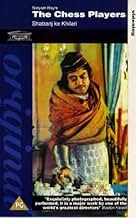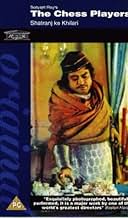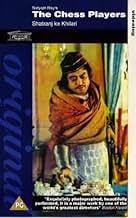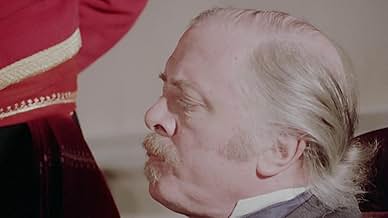ÉVALUATION IMDb
7,5/10
4,3 k
MA NOTE
Ajouter une intrigue dans votre langueIn 1856, two obsessed noblemen ignore everything while playing chess and fail to notice British rule extending into their Indian province.In 1856, two obsessed noblemen ignore everything while playing chess and fail to notice British rule extending into their Indian province.In 1856, two obsessed noblemen ignore everything while playing chess and fail to notice British rule extending into their Indian province.
- Prix
- 4 victoires et 3 nominations au total
Victor Banerjee
- Prime Minister
- (as Victor Bannerji)
Farooq Shaikh
- Aqueel
- (as Farooque Shaikh)
Bhudo Advani
- Abbajani
- (as Budho Advani)
Avis en vedette
This was my first Satyajit Ray movie. And I have to tell you that he truly deserved the lifetime Oscar that he got. The movie is a true classic. And Sanjeev Kumar proves again that what a class actor he is. Sayeed Jaffery and Amjad khan were also very good. The camera angles used in the movie were simply terrific. Especially that scene in which Sayeed Jaffery changes the pawns. This movie however I might say that is not for a regular movie viewer. As the story is slow and you get to know what a real art movie is. I hope Satyajit Ray would have made some more Hindi films for the Hindi viewers. I really loved it and would recommend it to anyone who loves art movies. A true gem of a movie.
Two aristocrats oblivious to what is going on around them play chess around the clock while the British plan a takeover of a northeastern Indian kingdom. These threads are interwoven seamlessly in Satyajit Ray's delightful comedy, The Chess Players, recently released on a Kino DVD. The film does not spare either side from the thrust of its gentle dagger, depicting both the apathy of the Indian upper classes and the arrogance of the colonial masters. Like many Satyajit Ray films, there are gorgeous dance sequences and appealing musical numbers, but unlike most, the spoken language is Urdu not Bengali, and it is a big budget film in Technicolor using name actors.
Based on a short story by Prem Chand, the film is set in Lucknow, India in 1856 and is narrated by the real Amitabh Bachchan. As the film opens, we learn that Oudh's King Wajid Ali Shah (Amjad Khan) has financed the British East India Company for ten years and also provided soldiers for its army. In exchange, the Company did not interfere with Wajid's rule, even though they viewed the king with disdain. This changed in 1856 when General Outram (Richard Attenborough) was instructed to depose the king and take over the kingdom to add to the British coffers. Outram, the local representative of the Company, justifies his ambitions for more territory by denouncing the king to an aide as an incompetent ruler and hedonist, ignoring his devotion to dance, poetry, and music.
In another thread, two Indian aristocrats Mirza (Sanjeev Kumar) and Meer (Saeed Jaffrey) play chess obsessively to the dismay of their wives, Khurshid (Shabana Azmi), and Nafisa (Fardia Jalal). Mirza's wife feeling neglected, steals and hides the chess pieces, while Meer's wife has an affair with his nephew (Farooq Shaikh). Unwilling to handle their domestic affairs, the two first use fruits and vegetables as their set pieces, then seek other places to play their game, refusing to believe that the British takeover is imminent. One of their stops is the home of their attorney who is on his deathbed. This doesn't stop the two from hilariously trying to sneak in a game of chess in another room.
The two players cling to their way of life, exchanging frivolous banter and smoking hookah pipes while the world around them crumbles. They finally take refuge in the home of a young boy, Kullu (Samarth Narain) who remained while others fled just to see the red-coated British soldiers march into the city. While perhaps not in the upper echelon of Ray's work, The Chess Players is a very entertaining political satire that provides wry insight into human nature and our capacity for denial. General Outram is portrayed as a well-meaning but totally condescending individual who utterly fails to understand the lives and culture of the people he seeks to control. Any resemblance to current U.S. Muddle-East policies, of course, is purely accidental.
Based on a short story by Prem Chand, the film is set in Lucknow, India in 1856 and is narrated by the real Amitabh Bachchan. As the film opens, we learn that Oudh's King Wajid Ali Shah (Amjad Khan) has financed the British East India Company for ten years and also provided soldiers for its army. In exchange, the Company did not interfere with Wajid's rule, even though they viewed the king with disdain. This changed in 1856 when General Outram (Richard Attenborough) was instructed to depose the king and take over the kingdom to add to the British coffers. Outram, the local representative of the Company, justifies his ambitions for more territory by denouncing the king to an aide as an incompetent ruler and hedonist, ignoring his devotion to dance, poetry, and music.
In another thread, two Indian aristocrats Mirza (Sanjeev Kumar) and Meer (Saeed Jaffrey) play chess obsessively to the dismay of their wives, Khurshid (Shabana Azmi), and Nafisa (Fardia Jalal). Mirza's wife feeling neglected, steals and hides the chess pieces, while Meer's wife has an affair with his nephew (Farooq Shaikh). Unwilling to handle their domestic affairs, the two first use fruits and vegetables as their set pieces, then seek other places to play their game, refusing to believe that the British takeover is imminent. One of their stops is the home of their attorney who is on his deathbed. This doesn't stop the two from hilariously trying to sneak in a game of chess in another room.
The two players cling to their way of life, exchanging frivolous banter and smoking hookah pipes while the world around them crumbles. They finally take refuge in the home of a young boy, Kullu (Samarth Narain) who remained while others fled just to see the red-coated British soldiers march into the city. While perhaps not in the upper echelon of Ray's work, The Chess Players is a very entertaining political satire that provides wry insight into human nature and our capacity for denial. General Outram is portrayed as a well-meaning but totally condescending individual who utterly fails to understand the lives and culture of the people he seeks to control. Any resemblance to current U.S. Muddle-East policies, of course, is purely accidental.
Shatranj Ke Khilari is the first Hindi film by who is undoubtedly the best film-maker India has ever had. Satyajit Ray made this movie in 1977, having established his reputation worldwide as an ace director with his Bengali art pieces.
Based in mid 19th century, this is an account of the British annexation of one of the last independent kingdoms of India, Awadh. The British, by that year, have quite a firm hold on the subcontinent and are keen to swallow down everything that has not yet been under their direct control. So the East India Company and its representative General Outram decide that it was time for the ruling king, Nawab Wajid Ali Shah to step down from his throne.
Wajid Ali Shah, the king, is that only by name. He is an indifferent ruler whose days and nights are occupied not with the affairs of state, but the artistic charms of music, poetry and dance. He is a ruler who finds it convenient to leave the important matters regarding his kingdom to his subordinates, while he indulges in life's countless pleasures. Inevitably, the British, sensing a weak king, are tempted to take over the control of the province.
Meanwhile, two of the king's friends, Mirza Sajid Ali and Mir Roshan Ali are busy satisfying their own personal urges. In a time when the king needs their help desperately, they engage all day in the old Indian game of Chess. Oblivious and indifferent to what is happening to Lucknow and their own private household, these chess-crazy men spend days challenging each other to games of a sport played with soldiers which are not real, but wooden pieces which move on a small 64-squared board. Their inconsequential moves on that board act as a substitute to the possible resistance they could have shown to the British takeover.
It is extremely difficult to find flaws in such a movie. As with all Ray movies, this movie doesn't have too much of a storyline to boast about. This is just a beautiful account which epitomizes the kind of inactivity and submission our country had sunk into in those times. The acting is, as expected, spotless. Everyone has done his part to perfection. The direction and camera-work are as good as any other Ray movie. The dialogues are as precise as we have got from movies like Umrao Jaan or Mughal-E-Azam. Each and every line spoken is worth listening to again and again. As an added attraction, Amitabh Bachchan has lent his voice for the narration, which is something he has done quite well.
The pace of the movie being slow, it is of course not everyone's cup of tea. But this movie is a must-watch for its brilliant acting and direction. And no other form of art can possibly be more expressive of the Indian mentality back in the 19th century.
Based in mid 19th century, this is an account of the British annexation of one of the last independent kingdoms of India, Awadh. The British, by that year, have quite a firm hold on the subcontinent and are keen to swallow down everything that has not yet been under their direct control. So the East India Company and its representative General Outram decide that it was time for the ruling king, Nawab Wajid Ali Shah to step down from his throne.
Wajid Ali Shah, the king, is that only by name. He is an indifferent ruler whose days and nights are occupied not with the affairs of state, but the artistic charms of music, poetry and dance. He is a ruler who finds it convenient to leave the important matters regarding his kingdom to his subordinates, while he indulges in life's countless pleasures. Inevitably, the British, sensing a weak king, are tempted to take over the control of the province.
Meanwhile, two of the king's friends, Mirza Sajid Ali and Mir Roshan Ali are busy satisfying their own personal urges. In a time when the king needs their help desperately, they engage all day in the old Indian game of Chess. Oblivious and indifferent to what is happening to Lucknow and their own private household, these chess-crazy men spend days challenging each other to games of a sport played with soldiers which are not real, but wooden pieces which move on a small 64-squared board. Their inconsequential moves on that board act as a substitute to the possible resistance they could have shown to the British takeover.
It is extremely difficult to find flaws in such a movie. As with all Ray movies, this movie doesn't have too much of a storyline to boast about. This is just a beautiful account which epitomizes the kind of inactivity and submission our country had sunk into in those times. The acting is, as expected, spotless. Everyone has done his part to perfection. The direction and camera-work are as good as any other Ray movie. The dialogues are as precise as we have got from movies like Umrao Jaan or Mughal-E-Azam. Each and every line spoken is worth listening to again and again. As an added attraction, Amitabh Bachchan has lent his voice for the narration, which is something he has done quite well.
The pace of the movie being slow, it is of course not everyone's cup of tea. But this movie is a must-watch for its brilliant acting and direction. And no other form of art can possibly be more expressive of the Indian mentality back in the 19th century.
Legendary Bengali director Ray's only film in Urdu, Shatranj Ki Khiladi or The Chess Players, looks at the denouement of Indian Muslim power in the 1850's, focusing on the northern state of Oudh, also known as Awadh, prior to the epochal 1857 'Mutiny'.
The film contains two narratives. One narrative focuses on the political machinations of the bullish, pragmatic representative of the British, General Outram, played capably by Richard Attenborough, and the diffident response of the cultured but cloud-headed Indian Muslim King of Oudh, played with great feeling by Amjad Khan.
The other narrative shifts focus to the tragi-comic situation of two well-born Indian Muslim gentlemen, played by the always-wonderful Saeed Jafarey and Sanjeev Kumar, and their obsession with a game of chess, leading them to neglect the momentous tide of history which is about to sweep over them. Indeed, not only is chess a metaphor for the power struggle between Indian and British, but the two chess players' family situations are too, with both men locked into domestic struggles with their wives, the haughty, beautiful Khurshid, played with characteristic commitment by Shabana Azmi and the lascivious, lying Nafisa, well-played by Farida Jalal.
The twin approach is useful and well integrated, and there is even some humorous animation. Ray brings his characteristic eye for ravishing beauty, balanced with his close, sympathetic interest in humanity, particularly when under pressure, and a real feeling for the period. Also typical is the universality of the director's humanitarian outlook, with the nominally Hindu Ray studying Muslims and the British with the same warm but clear-eyed assiduousness.
Overall, this is a film, like all of Ray's films, to treasure, not only for a person of Indian ancestry such as myself.
The film contains two narratives. One narrative focuses on the political machinations of the bullish, pragmatic representative of the British, General Outram, played capably by Richard Attenborough, and the diffident response of the cultured but cloud-headed Indian Muslim King of Oudh, played with great feeling by Amjad Khan.
The other narrative shifts focus to the tragi-comic situation of two well-born Indian Muslim gentlemen, played by the always-wonderful Saeed Jafarey and Sanjeev Kumar, and their obsession with a game of chess, leading them to neglect the momentous tide of history which is about to sweep over them. Indeed, not only is chess a metaphor for the power struggle between Indian and British, but the two chess players' family situations are too, with both men locked into domestic struggles with their wives, the haughty, beautiful Khurshid, played with characteristic commitment by Shabana Azmi and the lascivious, lying Nafisa, well-played by Farida Jalal.
The twin approach is useful and well integrated, and there is even some humorous animation. Ray brings his characteristic eye for ravishing beauty, balanced with his close, sympathetic interest in humanity, particularly when under pressure, and a real feeling for the period. Also typical is the universality of the director's humanitarian outlook, with the nominally Hindu Ray studying Muslims and the British with the same warm but clear-eyed assiduousness.
Overall, this is a film, like all of Ray's films, to treasure, not only for a person of Indian ancestry such as myself.
Shatranj Ke Khilari is Sayajit Ray's first Hindi movie. It is, though a bit too slow at points, special, different, comic, and as a result unusually entertaining. This satirical drama is humorous, interesting and impressive, and Ray's direction is excellent. It is evidently well invested, with glossy sets and costumes. The writing is superb, with the brilliantly-written dialogues surpassing the storyline itself, and the culture and the atmosphere of those times is captured exceedingly well. All these aspects, along with the music composed by Ray and the fantastic narration of Amitabh Bachchan, create an engagingly artistic and poetic piece. Ray casts some of the most talented leading actors from the Hindi film industry, all of whom suit their roles and do a wonderful job. Amjad Khan is great as Nawab Wajid Ali Shah. Sanjeev Kumar and Saeed Jaffrey are exceptional as the chess-obsessed noblemen, who ironically indulge in ceaseless chess playing while showing minimal interest in the state of their marriages, wives and even their nation. Shabana Azmi and Farida Jalal play their neglected wives, and they excel in their very tiny roles (each has only a few minutes on-screen). Azmi is convincing as the frustrated Khurshid and Jalal is awesome as the unfaithful wife who has an affair with her husband's nephew Aqueel. Richard Attenbrough and Victor Banerjee provide great support. Shatranj Ke Khilari is a nice little film. It is not among the very best of Ray, but it is certainly a worthy picture and of the most strikingly unique films of those times.
Le saviez-vous
- AnecdotesSatyajit Ray's only Hindi movie.
- Citations
Mir Roshan Ali: Jinse apni biwi-yan nahin sambhli woh angreaz fauz se kya ladenge. Translation : Those whom couldn't even care for their wives, would not be able to fight the British army.
- ConnexionsFeatured in Celluloid Man (2012)
Meilleurs choix
Connectez-vous pour évaluer et surveiller les recommandations personnalisées
- How long is The Chess Players?Propulsé par Alexa
Détails
- Date de sortie
- Pays d’origine
- Langues
- Aussi connu sous le nom de
- The Chess Players
- Lieux de tournage
- Indrapuri Studios, Calcutta, Bengale occidental, Inde(studio: Indrapuri Studios, Calcutta)
- société de production
- Consultez plus de crédits d'entreprise sur IMDbPro
- Durée2 heures 9 minutes
- Mixage
Contribuer à cette page
Suggérer une modification ou ajouter du contenu manquant

































